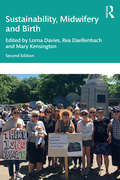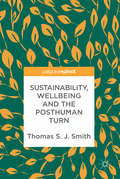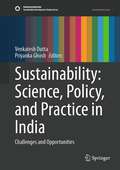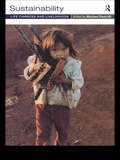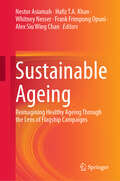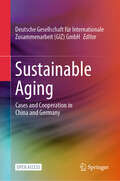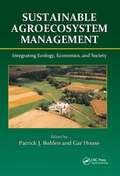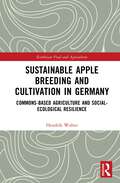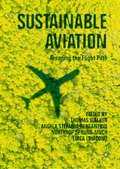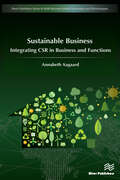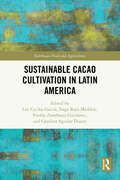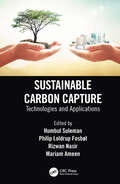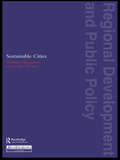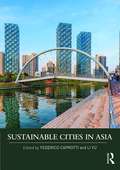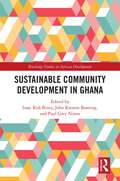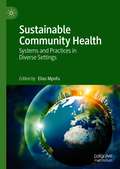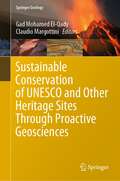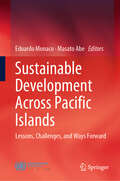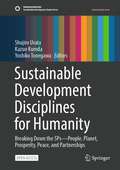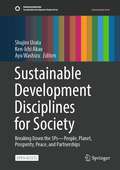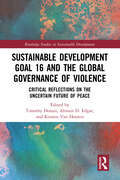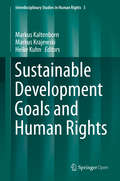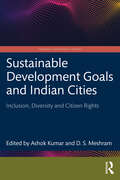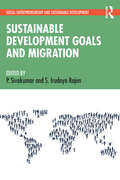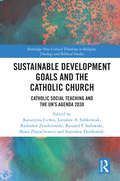- Table View
- List View
Sustainability, Midwifery and Birth
by Lorna DaviesThis new edition outlines how sustainability can be incorporated into midwifery practice, education and research. It has been thoroughly revised to include new models of sustainable midwifery practice and new chapters on rural midwives and rural communities, social justice, and compassion. Environmental awareness and sustainability are vitally important concepts and, as a low environmental impact healthcare profession, midwifery has the potential to stand as a model of excellence. This international collection of experts explores the challenges, inviting readers to critically reflect on the issues and consider how they could move to effect changes within their own working environments. Divided into three parts, the book discusses: The politics of midwifery and sustainability Midwifery as a sustainable healthcare practice Supporting an ecological approach to parenting. Sustainability, Midwifery and Birth is a vital read for all midwives and midwifery students interested in sustainable practice.
Sustainability, Wellbeing and the Posthuman Turn
by Thomas S. SmithThis book examines how the way we conceive of, or measure, the environment changes the way we interact with it. Thomas Smith posits that environmentalism and sustainable development have become increasingly post-political, characterised by abstraction, and quantification to an unprecedented extent. As such, the book argues that our ways of measuring both the environment, such as through sustainability metrics like footprints and Payments for Ecosystem Services, and society, through gross domestic product and wellbeing measures, play a constitutive and problematic role in how we conceive of ourselves in the world. Subsequently, as the quantified environmental approach drives a dualistic wedge between the human and non-human realms, in its final section the book puts forward recent developments in new materialism and feminist ethics of care as providing practical ways of re-founding sustainable development in a way that firmly acknowledges human-ecological relations. This book will be an invaluable reference for scholars and students in the fields of human geography, political ecology, and environmental sociology.
Sustainability: Challenges and Opportunities (Sustainable Development Goals Series)
by Venkatesh Dutta Priyanka GhoshThis book is an interdisciplinary work that reveals the contemporary sustainability narratives in India within the context of various SDGs. Several case studies are presented, each of which sheds light on the challenges and constraints that are impeding the process of achieving SDGs and investigates potential long-term answers to socio-economic and environmental issues. Through empirical case studies from different parts of India, the book explores the current status of achieving sustainable development goals in India. The volume immensely benefits scientists, researchers, policymakers and practitioners as it offers a thematic and comprehensive understanding of challenges associated with mainstreaming SDGs at national, sub-national, and micro scales in India.
Sustainability: Life Chances and Livelihoods
by Michael RedcliftThe concept of sustainability is traditionally viewed in exclusively environmental terms. Sustainability: Life Chances and Livelihoods links peoples livelihoods and life chances to the concept of sustainability by examining the way in which social and economic processes complement and compound environmental change. Looking at the main ingredients of sustainable development - health, economic policy, land use, ethics and education, in both the north and south, this book demonstrates the way in which the life chances of individuals both effect and are affected by, their environments.Sustainability: Life Chances and Livelihoods shows that the scope of sustainability thinking needs to be widened to embrace public policies and experiences in both developed and developing countries.By providing a comparative focus, both spatially and temporally, the contributors demonstrate how the environmental concerns of the northern developed world are culturally translated into the south, often into immediate survival questions.
Sustainable Ageing: Reimagining Healthy Ageing Through the Lens of Flagship Campaigns
by Hafiz T. A. Khan Nestor Asiamah Whitney Nesser Frank Frimpong Opuni Alex Siu Wing ChanThis book uniquely operationalizes "sustainable ageing" as a concept for reimagining ways by which: (1) social and health threats (i.e., climate change events, extreme industrialization, infectious disease outbreak, and war) can constrain the implementation of healthy ageing campaigns or limit their outcomes, and (2) potential transdisciplinary strategies can be rolled out to optimize healthy ageing through the campaigns in contexts experiencing the threats. The United Nations Decade of Healthy Ageing 2021-2030 initiative drives major healthy ageing campaigns and encapsulates 10 initiatives for enabling people to maintain health as they age. Worsening social and health threats are, however, hindering the implementation of the campaigns. Consequently, healthy ageing may not be achieved or sustained, even in age-friendly contexts experiencing crises. Scholars agree these threats will adversely impact public health and an inclusive multidisciplinary approach to healthy ageing is necessary amidst the threats. This book provides an understanding of how healthy ageing should be framed and approached through the campaigns in a world experiencing crises. Among the topics covered are: Psychology of “Ageing in Place” Amidst Health and Social Threats: Perspectives on the Decade of Healthy Ageing Climate Change Adaptation for Healthy Ageing Research-Practice Gap: Impact on Campaigns and Mitigation Strategies Human Development Pathways for Empowering Older Adults: A Decade of Healthy Ageing Perspective Initiatives to Fight Ageism, Neglect, and Elderly Abuse During Crises: A Healthy Ageing Perspective Sustainable Ageing: Reimagining Healthy Ageing Through the Lens of Flagship Campaigns is a timely publication with broad appeal. Each chapter provides empirical evidence or models for improving stakeholders’ understanding of campaign-related healthy ageing programmes, how the programmes are affected by the threats, and what can be done to achieve the core goals in contexts experiencing threats. Students, lecturers, and researchers can use the book as a research guide, whereas public health professionals and organizations can use it to develop or alter policies. Researchers in a wide range of disciplines can design studies based on models and insights from the book.
Sustainable Aging: Cases and Cooperation in China and Germany
by Deutsche Gesellschaft für Internationale Zusammenarbeit (GIZ) GmbHThis open access book discusses three areas in which Germany has long-standing experience and solutions that are valuable for other countries—care education, care insurance and standards for age-friendly city neighborhoods. It introduces the development background, application and shortcomings in the German and Chinese context, providing examples for from around the globe and showcasing the role of international cooperation projects in promoting knowledge exchange and advising on implementation in the country-specific context. Fast-paced demographic changes present a pressing challenge around the world. In Europe, the demographic problem, along with discussions on solutions, has been prevalent for many decades. And recently, it has also reached formerly developing countries in Asia, such as China. International cooperation, including international development cooperation, promotes the exchange of ways to tackle the social and economic challenges in order to find globally applicable solutions, thereby contributing to sustainable development. By presenting lessons learned in other countries, this book provides guidance for policy makers, city representatives and academicians seeking solutions for the challenges of an aging society in their own countries. Although the application of interventions is context-specific, the discussion and exchange on available solutions are essential to achieving socially sustainable and inclusive societies.
Sustainable Agroecosystem Management: Integrating Ecology, Economics, and Society
by Patrick J. Bohlen Gar HouseEmphasizes Centrality of the Ecosystem Perspective: Sustainable management of agroecosystems in the 21st century faces unprecedented challenges. Protecting the environment while feeding a burgeoning population that could reach nine billion by mid-century, preserving the world’s biodiversity, and sustaining agriculture in an increasingly urban world is a massive undertaking. Avoiding simple prescriptions for the application of ecological principles to agriculture, Sustainable Agroecosystem Management: Integrating Ecology, Economics, and Society emphasizes the continued centrality of the ecosystem perspective, and the need to integrate ecological, economic, and social considerations in agroecosystem science and management. Truly Interdisciplinary in Scope: With contributions from distinguished leaders in the field of sustainable agriculture, this authoritative book first delineates the present and future challenges agroecosystems face. It then reviews the important contributions made by Dr. Ben Stinner, a pioneer in the field of agroecosystem ecology. Providing historical background of attempts to connect the ecological and agricultural sciences, this standard-setting resource highlights recent efforts to integrate natural and social science perspectives. It also examines the challenges for developing integrated approaches to agroecosystem management. Through a variety of case studies with global applications, the text makes it abundantly clear that purely technological approaches are insufficient for solving the food systems problems of the future. It explores practical innovative strategies, policies, and research needs necessary to develop management approaches that emphasize whole system productivity, diversify agricultural operations, and sustain multiple functions, including ecological integrity.
Sustainable Apple Breeding and Cultivation in Germany: Commons-Based Agriculture and Social-Ecological Resilience (Earthscan Food and Agriculture)
by Hendrik WolterApplying a socio-ecological framework, this book explores how the innovative approach of commons-based organic apple breeding can contribute to sustainability in agricultural and food systems more widely. As fruit breeding and cultivation systems are confronted with a range of sustainability challenges, there are calls for new and innovative breeding approaches beyond mainstream economic solutions that would mitigate these sustainability challenges. Apples, in particular, are facing serious environmental challenges, with the negative environmental impacts of modern conventional breeding and farming, loss of agrobiodiversity, low participation and diminishing diversity of market actors in the wake of privatization and economization trends result in a lack of resilience in current breeding and cultivation systems. Drawing on in-depth case study research on apple production in Germany, this book advances the innovative solution of commons-based apple breeding as a model for developing resilience in fruit breeding and cultivation. It analyzes this approach, comparing it with more conventional practices, and showcases which factors could inhibit the broad implementation of commons-based apple breeding and how they can be overcome to exploit its full potential. Contributing to the great ambition of finding sustainable solutions across all agricultural sectors, this book opens up new and interdisciplinary perspectives on fruit breeding and cultivation, which is a largely neglected issue in contemporary discussions on agriculture and food production. This book will be of great interest for students and scholars from the fields of sustainable food systems, sustainable agriculture, crop science, and resource management and in particular those that seek inspiration for innovative approaches rooted in sustainability research, social-ecological resilience, and the commons.
Sustainable Aviation: Greening the Flight Path
by Thomas Walker Angela Stefania Bergantino Northrop Sprung-Much Luisa LoiaconoThis book highlights the latest research in the field of Sustainable Aviation. In recent decades, there have been considerable improvements in aircraft efficiency and noise reduction. However, with the demand for both passenger and freight transportation expected to increase significantly in future years, the aviation sector is becoming a growing source of environmental problems and a major contributor to global warming.Focusing on the need to address this mounting problem, this book discusses important new trends and outlines likely future developments in carbon emission reduction, carbon trading, and the impact of emerging technologies, as well as social, legal, and regulatory changes as they pertain to the aviation sector. The book offers an invaluable reference guide for practitioners, regulators, academics, and students alike, in fields ranging from business and engineering to the social sciences. It can be used as a textbook, and will benefit anyone interested in the future of aviation and our planet.
Sustainable Business: Integrating CSR in Business and Functions (River Publishers Series In Multi Business Model Innovation, Technologies And Sustainable Business Ser.)
by Annabeth AagaardThe developments in our environment and society has made it clear that the way we run our businesses and govern our nations is not sustainable in the long run. This is also why more and more companies and organizations are pursuing sustainable business through various Corporate Social Responsibility (CSR) activities. However, many companies experience that although they facilitate a CSR strategy on corporate level, CSR is often not embedded in their business and/or integrated across their functions. If companies are to achieve the full business potential and performance impact of CSR, sustainability has to be operationalized, targeted and measured across the value chain through empowered employees and in alignment with the business strategy of the company. Though state-of-the-art CSR research, theories and models, the theoretical platform for sustainable business and CSR is presented in this book. However, CSR is carried out in practice, and not just in theory. This is why each chapter is supplemented with practical case examples explaining the way in which different companies and their managers have integrated sustainable business in their strategy and across the organizations’ different functions. As is evident both in theory and practice, the success of CSR integration is highly affected by industrial context, as the unique characteristics of the industry have an impact on the key sustainability challenges and business opportunities of the specific company and industry. In support of this evidence, the book also reveals how CSR can be implemented across private and public organizations as well as small & medium sized entities (SMEs).
Sustainable Cacao Cultivation in Latin America (Earthscan Food and Agriculture)
by Naga Raju Maddela Luz Cecilia García Freddy Zambrano Gavilanes Carolina Aguilar DuarteThis book examines cacao cultivation with a view to improving the sustainable management and production of this crop.Theobroma cacao is an important species originating in the Ecuadorian Amazon and its product chocolate is consumed worldwide. Cacao cultivation is an industry supporting over ten million people, and so it is vitally important, in this changing climate, that the species is properly and sustainably managed and cultivated. This book brings together a wide range of experts from across the globe to examine cacao cultivation, from the basic aspects of reproduction, genetic improvement, nutrition and pest management, to agroforestry, industrialization and marketing in a global food system. Case studies are drawn from across Latin America, but the research reflects the nature of a crop that is cultivated in over 60 countries and processed, manufactured and consumed worldwide.This book will be of great interest to students and scholars of agronomy, sustainable agriculture, and crop science.
Sustainable Carbon Capture: Technologies and Applications
by Humbul Suleman Philip Loldrup Fosbøl Rizwan Nasir Mariam AmeenA comprehensive resource on different aspects of sustainable carbon capture technologies including recent process developments, environmentally friendly methods, and roadmaps for implementations. It discusses also the socio-economic and policy aspects of carbon capture and the challenges, opportunities, and incentives for change with a focus on industry, policy, and governmental sector. Through applications in various fields of environmental health, and four selected case studies from four different practical regimes of carbon capture, the book provides guidelines for sustainable and responsible carbon capture and addresses current and future global energy, environment, and climate concerns.
Sustainable Cities (Regions and Cities #No.7)
by Graham Haughton Colin HunterSustainable Cities simultaneously tackles two issues of immediate public concern which also find themselves high on the policy agenda: sustainable environmental development and urban development. The themes of the book - the bringing together of the insights of environmental science, the social sciences and management; the combination of problem analysis with practical application; and a critique of urban environmental problems concentrating on air and water pollution - are illustrated throughout with in-depth material and case studies taken from around the world and are approached from a variety of perspectives: economic, ecological and managerial. Each chapter has a concluding section pointing to key concepts, key reading and a range of discussion points.
Sustainable Cities in Asia
by Li Yu Federico CaprottiWith Asia’s cities undergoing unprecedented growth in the 21st century, lauded the ‘urban century’ by many, Sustainable Cities in Asia provides a timely examination of the challenges facing cities across the continent including some of the projects, approaches and solutions that are currently being tested. This book uses numerous case studies, analysing topical issues ranging from city cycling in India, to green spaces in China, to the use of community-led energy generation projects in post-Fukushima Japan. Containing contributions from an international team of scholars, it also takes a multi-disciplinary approach and draws on examples from a wide range of countries, including China, India, Japan, Korea, Taiwan, Singapore and the United Arab Emirates. Ultimately, by providing a comprehensive discussion of the broader debates around the shape of sustainable urbanism, it demonstrates that Asia is one of the most active regions in terms of the development of sustainable city strategies. Tackling the contemporary issues of key importance for sustainability, such as property markets, migration and transport, this book will appeal to students and scholars of Urban Geography, Sustainability, Environmental Studies and Asian studies.
Sustainable Community Development in Ghana (Routledge Studies in African Development)
by John Kwame Boateng Isaac Kofi Biney Paul Gary NixonThis book explores sustainable community development in Ghana post-COVID-19, highlighting examples of how individuals facing extreme challenges have adapted to their changing circumstances.Through the voices of African researchers, it explores the different responses that local, subnational, and national stakeholders and communities initiated to preserve the gains made in achieving the Sustainable Development Goals in Ghana during the global pandemic. This collection considers how policy makers are tackling the pressing issues of sustainability, climate change and its effects on Africa and Ghana in particular, and multi-stakeholder policy responses to building communities in a post-COVID-19 world. The case studies show how communities are interacting to ensure sustainable community development and learning in the Global South, and the role that education and learning, both formal and informal, play in strengthening livelihoods, choices, and opportunities in African communities.An assessment of multi-stakeholder policy responses to building communities in Ghana, this book will be of interest to scholars and students in the field of Education, Education Management, Sociology, Economics, and African Studies. It will also be of interest to policy makers and practitioners engaged in community development programmes and activities and the development of associated policies.
Sustainable Community Health: Systems and Practices in Diverse Settings
by Elias MpofuApplying a trans-disciplinary approach, this book provides a comprehensive, research-based guide to understanding, implementing, and strengthening sustainable community health in diverse international settings. By examining the interdependence of environmental, economic, public health, community wellbeing and development factors, the authors address the systemic factors impacting health disparities, inequality and social justice issues. The book analyzes strategies based on a partnership view of health, in which communities determine their health and wellness working alongside local, state and federal health agencies. Crucially, it demonstrates that communities are themselves health systems and their wellbeing capabilities affect the health of individuals and the collective alike. It identifies health indicators and tools that communities and policy makers can utilize to sustain truly inclusive health systems. This book offers a unique resource for researchers and practitioners working across psychology, mental health, rehabilitation, public health, epidemiology, social policy, healthcare and allied health.
Sustainable Conservation of UNESCO and Other Heritage Sites Through Proactive Geosciences (Springer Geology)
by Claudio Margottini Gad Mohamed El-QadyThis book presents up-to-date geoscience technologies for heritage investigations and conservation, covering various sub-disciplines of geophysics, geodesy, 3D laser scanning technology, hydrogeology, and rock mechanics applied to the exploration of new heritage sites, mapping and visualization, as well as hazard mitigation. The current shift toward interdisciplinary ways of thinking highlights the added value of merging arts with sciences and other disciplines for better management and preservation of cultural heritage. Featuring advanced scientific investigations in 40 case studies around the globe, the book demonstrates how a better understanding of natural processes coupled with conservation approaches, mainly based on sustainable practices such as the use of traditional knowledge in recovery techniques and building local capacities, can ensure effective conservation.
Sustainable Development Across Pacific Islands: Lessons, Challenges, and Ways Forward
by Edoardo Monaco Masato AbeThis timely and ambitious volume - a product of close research collaboration with the United Nations Multi-Country Office for Micronesia - is conceived as a holistic “journey” across various domains of progress in a region that, despite fundamental common traits, remains vast and diverse. Pacific island countries and territories (PICTs) have (too) often been identified with elements of vulnerability, whether these be social, economic, or environmental in nature. While these factors cannot be overlooked, this volume aims to showcase not only the long-standing and emerging challenges but, perhaps more importantly, the opportunities, the resilience, the resourcefulness, and the ambition that local socioeconomic development patterns in the Pacific already encompass. Beyond PICTs themselves, we hope that the analyses collected in this book will contribute to highlighting the global significance of the human–nature nexus in the current Anthropocene. Often captured in the concept of “small islands, big oceans”, the importance of the region and its islands and peoples transcends the geographical remoteness and small size of many PICTs.
Sustainable Development Disciplines for Humanity: Breaking Down the 5Ps—People, Planet, Prosperity, Peace, and Partnerships (Sustainable Development Goals Series)
by Kazuo Kuroda Shujiro Urata Yoshiko TonegawaThis Open Access book provides eight problem solving lectures for sustainable development for people, peace, and partnerships. Those are three of the five keywords for the Sustainable Development Goals (SDGs): people, the planet, prosperity, peace, and partnerships or “the 5Ps”. Each of these lectures is classified into one of the keywords for SDGs and based on the history of social thought, human development, law, education, sociology, and peace studies. Further, each lecture delineates the essence of each discipline when it is practically applied to development studies. This book, Sustainable Development Disciplines for Humanity, along with its sister volume related to the planet and prosperity, Society, will be useful in studying development. Interdisciplinary research is necessary to achieve the SDGs advocated by the United Nations. Hence, it is essential to learn the basics of individual disciplines, as they each offer ample knowledge fostering problem solving through the accumulation of existing research. This and its sister volume are the first comprehensive textbooks summarizing the essence of each necessary discipline to approach development studies from an interdisciplinary perspective. In developing countries, this book will provide access to development research for readers aiming to further develop their own nations. Moreover, in developed countries, the book will provide access to problem-solving research for readers seeking holistic solutions to complex social problems.
Sustainable Development Disciplines for Society: Breaking Down the 5Ps—People, Planet, Prosperity, Peace, and Partnerships (Sustainable Development Goals Series)
by Shujiro Urata Ken-Ichi Akao Ayu WashizuThis multidisciplinary Open Access book provides nine problem-solving lectures for sustainable development for the planet and prosperity. Those are two of the five keywords for the Sustainable Development Goals (SDGs): people, the planet, prosperity, peace, and partnerships, or “the 5Ps”. Each of these lectures is classified into one of the keywords for SDGs and based on law, economics, management, international trade, input–output analysis, or agricultural and urban engineering. Further, each lecture delineates the essence of each discipline when it is practically applied to development studies. This book, Sustainable Development Disciplines for Society, along with its sister volume related to the people, peace and partnerships, will be useful in studying development. Interdisciplinary research is necessary to achieve the SDGs advocated by the United Nations. Hence, it is essential to learn the basics of individual disciplines, as they each offer ample knowledge fostering problem solving through the accumulation of existing research. This and its sister volume are the first comprehensive textbooks summarizing the essence of each necessary discipline to approach development studies from an interdisciplinary perspective. In developing countries, this book will provide access to development research for readers aiming to further develop their own nations. Moreover, in developed countries, this book will provide access to problem-solving research for readers seeking holistic solutions to complex social problems.
Sustainable Development Goal 16 and the Global Governance of Violence: Critical Reflections on the Uncertain Future of Peace (Routledge Studies in Sustainable Development)
by Timothy Donais Alistair D. Edgar Kirsten Van HoutenThis book brings together a diverse range of scholars and practitioners working at the nexus of peace and development to reflect, at the mid-way point of the Sustainable Development Goals implementation period, what impact Goal 16 has made, or may yet make, toward reducing violence in ‘all its forms.’ Adopted in 2015, the Sustainable Development Goals include 17 objectives designed to shape and direct the global development agenda through to 2030, with Goal 16 aiming to promote ‘peaceful and inclusive societies for sustainable development.’ Amidst an ongoing global pandemic, evidence of a fracturing liberal international order, and the persistence of seemingly intractable conflict in large parts of the world, this volume takes stock of current progress toward providing access to justice and ensuring inclusive and democratic institutions. Across 15 chapters, the book’s contributors explore the universal aspirations of Goal 16 and its specific implications for conflict-affected states, which continue to experience ‘development in reverse,’ and for historically marginalized groups such as women, youth, the disabled, and indigenous peoples. In doing so, it offers a comprehensive assessment of Goal 16’s broader contribution to the creation of a more just, peaceful world against the realities of societies emerging from the COVID-19 pandemic and grappling with a deepening climate crisis. This volume will appeal to scholars, researchers, policymakers, and postgraduate students in sustainable development, global governance, international relations, global development, international law, and political science.
Sustainable Development Goals and Human Rights (Interdisciplinary Studies in Human Rights #5)
by Markus Krajewski Markus Kaltenborn Heike KuhnThis open access book analyses the interplay of sustainable development and human rights from different perspectives including fight against poverty, health, gender equality, working conditions, climate change and the role of private actors. Each aspect is addressed from a more human rights-focused angle and a development-policy angle. This allows comparisons between the different approaches but also seeks to close gaps which would remain if only one perspective would be at the center of the discussions. Specifically, the book shows the strong connections between human rights and the objectives of the 2030 Agenda for Sustainable Development and the Sustainable Development Goals adopted by the United Nations in 2015. Already the preamble of this document explicitly states that “the 17 Sustainable Development Goals ... seek to realise the human rights of all”. Moreover, several goals and targets of the 2030 Agenda correspond to already existing individual human rights obligations. The contributions of this volume therefore also address how the implementation of human rights and SDGs can reinforce each other, but also point to critical shortcomings of the different approaches.
Sustainable Development Goals and Indian Cities: Inclusion, Diversity and Citizen Rights (Towards Sustainable Futures)
by Ashok Kumar D. S. MeshramThis book critically examines Sustainable Development Goals and cities in developing countries with special reference to climate change, inclusion, diversity, and citizen rights in India. It discusses global issues of sustainability and climate change in the context of rapid urbanisation and focuses on the role of equitable and just processes of urban development aimed at protecting social diversity, redeeming natural environments and, pursuing economic growth geared towards improving the quality of life. The volume looks at the nature of opportunities and future challenges presented to cities and codifies ways to transcend these. It explores key themes such as mitigation of risks from heat island effects, devastating floods, and extreme weather events like droughts; improvement of air quality; compact development; reduction in urban sprawl and protection of agriculturally productive lands for long-term food security; growth of small and medium towns; protection of rural landscapes; access to basic services like water sanitation, primary education, and housing; protection of forest and green spaces for the conservation of biodiversity; renewable energy sources; enhancement of mobility through efficient public transit systems like metro systems or suburban rail; effective and equitable governance for the vulnerable; balanced regional development; inclusive human development; securing the right to the city; and climate risk and resilience. Based on new research and data presented by global experts on climate change and sustainability, this book advances multiple discourses of sustainable urbanisation by connecting social challenges such as democracy, equity, diversity, and inclusion to create an enabling environment for a better future for cities in the developing world. Lucid and topical, this book will be useful to scholars and researchers of urban studies, urban planning, development studies, sociology, public policy and administration, political sociology, city studies, geography, architecture, and economics and also to professionals and NGOs.
Sustainable Development Goals and Migration (Towards Sustainable Futures)
by P. Sivakumar S. Irudaya RajanThis book looks at migration in contemporary society and its interrelations with development. It presents the complexities and dilemmas associated with migration, the changes in theoretical and historical perspectives on migration and development, and the role of policies and the sustainable development goals in this context. The volume views migration as a phenomenon for advancing human development outcomes. It deals with wide-ranging issues including labour migration, the idea of decent work, migration and transnationalism, remittances, social networks and capital, and addressing poverty. The chapters highlight the focus of the Sustainable Development Goals (SDGs) and its relevance on migrant rights, safeguarding livelihoods and health. They also offer insights into regional and international co-operation on policies for migration, social growth and protection, and citizenship. With comparative analyses of data, trends and development indicators as well as various case studies, this volume examines the impact of migration on international relations and politics, labour market outcomes, gender, youth and education among others. It also discusses the loss of lives and livelihoods due to the Covid-19 pandemic, its impact on migration and the effects of the pandemic on the contemporary discussions on migration and SDGs. Rich in empirical data, this book will be an excellent read for scholars and researchers of migration and diaspora studies, development studies, refugee studies, public policy and governance, international relations, political studies, political economy, sociology and South Asian Studies.
Sustainable Development Goals and the Catholic Church: Catholic Social Teaching and the UN’s Agenda 2030 (Routledge New Critical Thinking in Religion, Theology and Biblical Studies)
by Ski Katarzyna Cichos Stanis 322 Jaros 322 Aw A. Sobkowiak Ryszard F. Sadowski Beata Zbarachewicz Rados 322 Aw Zenderowski Aw Dzieko 324This book identifies both the consistencies and disparities between Catholic Social Teaching and the United Nation’s (UN) Sustainable Development Goals (SDGs). With Pope Francis’ Laudato si’ encyclical, Catholicism seems to be engaging more than ever with environmental and developmental concerns. However, there remains the question of how these theological statements will be put into practice. The ongoing involvement of the Catholic Church in social matters makes it a significant potential partner in issues around development. Therefore, with the use of the comparative method, this book brings together authors from multiple disciplines to assess how the political and legal aspects of each of the UN’s 17 SDGs are addressed by Catholic Social Teaching. Chapters answer the question of how the Catholic Church evaluates the concept of sustainable development as defined by the Agenda 2030 Goals, as well as assessing how and if it can contribute to shaping the contemporary concept of global development. Examining the potential level of cooperation between the international community and the Catholic Church in the implementation of the Agenda 2030 Goals, this volume will be of keen interest to scholars of Catholic Studies, Religious Studies and the Sociology of Religion, as well as Environmental Studies and Development Studies.
